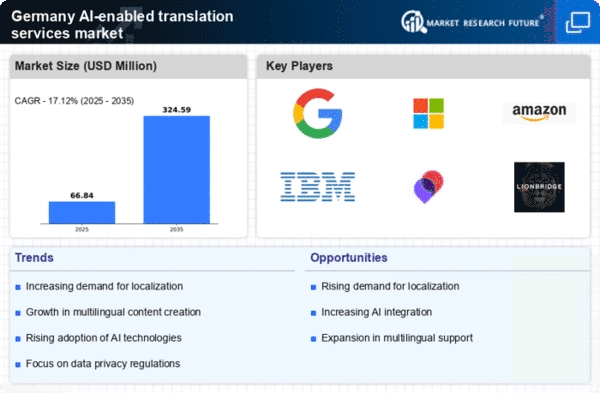Technological Advancements in AI
Technological advancements in artificial intelligence are profoundly influencing the ai enabled-translation-services market in Germany. Innovations in machine learning and natural language processing are enhancing the accuracy and efficiency of translation services. For instance, the introduction of neural machine translation has significantly improved the quality of translations, making them more contextually relevant. As a result, businesses are increasingly adopting these advanced technologies to meet their translation needs. The German market is witnessing a shift towards automated solutions, with an estimated 60% of companies planning to integrate AI-driven translation tools into their workflows by 2026. This trend indicates a growing reliance on technology to facilitate communication across language barriers, thereby propelling the ai enabled-translation-services market forward.
Increased Globalization of Businesses
The ongoing globalization of businesses is a critical driver for the ai enabled-translation-services market in Germany. As companies seek to penetrate international markets, the necessity for effective communication in multiple languages becomes increasingly evident. This trend is particularly pronounced in industries such as finance, healthcare, and technology, where accurate translations are essential for compliance and customer engagement. Recent statistics suggest that approximately 70% of German companies are actively pursuing international expansion strategies, which in turn fuels the demand for translation services. The need for seamless communication across borders is likely to bolster the growth of the ai enabled-translation-services market, as organizations invest in solutions that facilitate multilingual interactions.
Rising Demand for Localization Services
The ai enabled-translation-services market in Germany is experiencing a notable surge in demand for localization services. As businesses expand their reach into diverse linguistic markets, the need for accurate and culturally relevant translations becomes paramount. This trend is particularly evident in sectors such as e-commerce and software development, where localized content can significantly enhance user experience. According to recent data, the localization market in Germany is projected to grow at a CAGR of 7.5% over the next five years. This growth is likely to drive investments in ai enabled-translation-services, as companies seek to streamline their localization processes and improve efficiency. Consequently, the increasing emphasis on localization is a key driver for the ai enabled-translation-services market, as organizations strive to cater to the unique preferences of their target audiences.
Growing Importance of Data Privacy Regulations
The growing importance of data privacy regulations in Germany is shaping the landscape of the ai enabled-translation-services market. With the implementation of stringent laws such as the General Data Protection Regulation (GDPR), businesses are increasingly cautious about how they handle sensitive information during translation processes. This regulatory environment necessitates the adoption of secure and compliant translation solutions, which can drive demand for specialized ai enabled-translation-services that prioritize data protection. Companies are likely to seek providers that can ensure confidentiality and adhere to legal requirements, thereby influencing their choice of translation services. As a result, the focus on data privacy is expected to play a significant role in the evolution of the ai enabled-translation-services market.
Shift Towards Remote Work and Digital Collaboration
The shift towards remote work and digital collaboration is significantly impacting the ai enabled-translation-services market in Germany. As organizations adapt to new work environments, the need for effective communication tools that support remote teams becomes increasingly critical. This trend has led to a rise in demand for translation services that can facilitate collaboration among multilingual teams. Companies are investing in ai enabled-translation-services to ensure that language barriers do not hinder productivity and teamwork. Recent surveys indicate that over 50% of German businesses are prioritizing digital solutions to enhance remote collaboration, which is likely to drive growth in the ai enabled-translation-services market. The emphasis on seamless communication in a remote work setting is expected to continue influencing market dynamics.
















